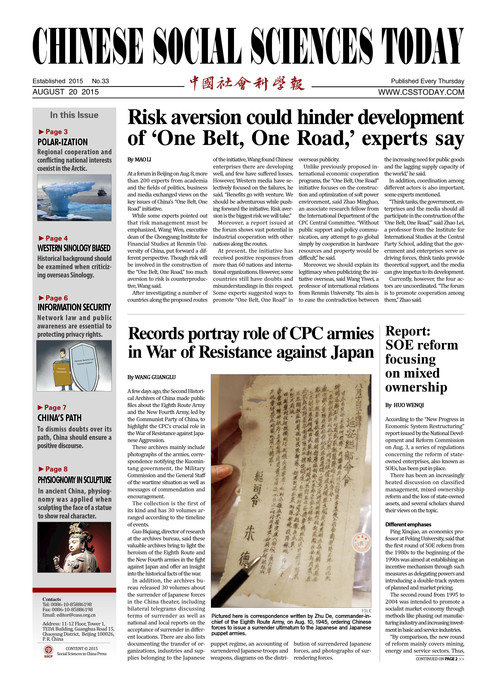Risk aversion could hinder development of ‘One Belt, One Road,’ experts say
2015-08-19 16:01:05
By MAO LI
At a forum in Beijing on Aug. 8, more than 200 experts from academia and the fields of politics, business and media exchanged views on the key issues of China’s “One Belt, One Road” initiative.
While some experts pointed out that risk management must be emphasized, Wang Wen, executive dean of the Chongyang Institute for Financial Studies at Renmin University of China, put forward a different perspective. Though risk will be involved in the construction of the “One Belt, One Road,” too much aversion to risk is counterproductive, Wang said.
After investigating a number of countries along the proposed routes of the initiative, Wang found Chinese enterprises there are developing well, and few have suffered losses. However, Western media have selectively focused on the failures, he said. “Benefits go with venture. We should be adventurous while pushing forward the initiative. Risk aversion is the biggest risk we will take.”
Moreover, a report issued at the forum shows vast potential in industrial cooperation with other nations along the routes.
At present, the initiative has received positive responses from more than 60 nations and international organizations. However, some countries still have doubts and misunderstandings in this respect. Some experts suggested ways to promote “One Belt, One Road” in overseas publicity.
Unlike previously proposed international economic cooperation programs, the “One Belt, One Road” initiative focuses on the construction and optimization of soft power environment, said Zhao Minghao, an associate research fellow from the International Department of the CPC Central Committee. “Without public support and policy communication, any attempt to go global simply by cooperation in hardware resources and property would be difficult,” he said.
Moreover, we should explain its legitimacy when publicizing the initiative overseas, said Wang Yiwei, a professor of international relations from Renmin University. “Its aim is to ease the contradiction between the increasing need for public goods and the lagging supply capacity of the world,” he said.
In addition, coordination among different actors is also important, some experts mentioned.
“Think tanks, the government, enterprises and the media should all participate in the construction of the ‘One Belt, One Road,’” said Zhao Lei, a professor from the Institute for International Studies at the Central Party School, adding that the government and enterprises serve as driving forces, think tanks provide theoretical support, and the media can give impetus to its development.
Currently, however, the four actors are uncoordinated. “The forum is to promote cooperation among them,” Zhao said.



